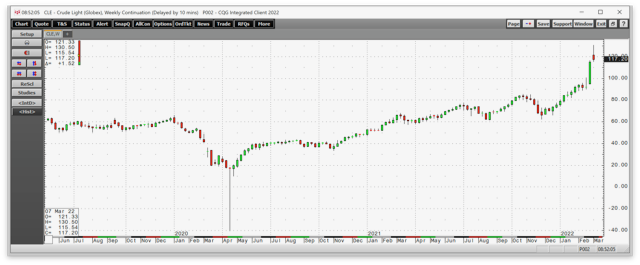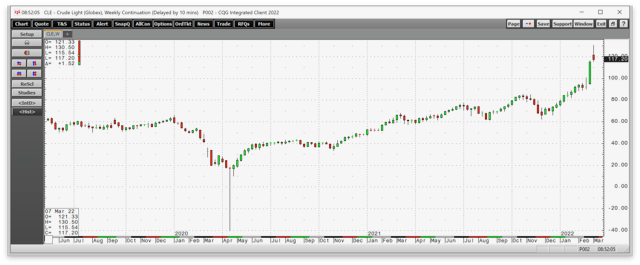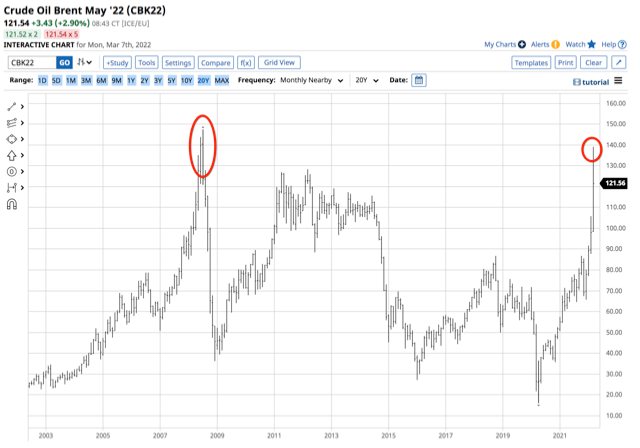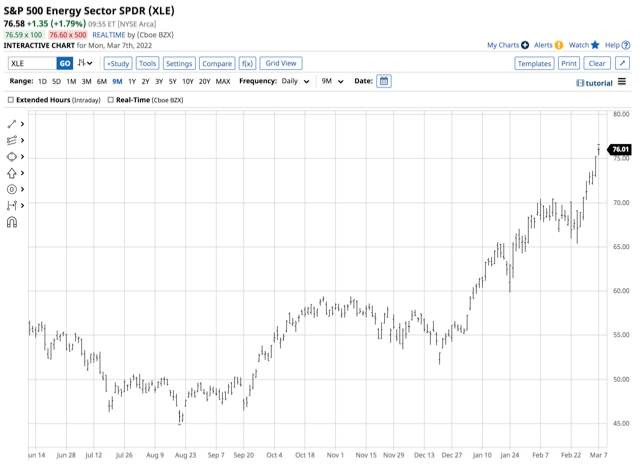UnitedHealth tests AI system to streamline medical claims processing - Bloomberg
This article was written exclusively for Investing.com
- Sanctions on Russia, retaliation bullish for oil
- Western oil companies should benefit
- U.S., European companies have exposure in Russia
- Wave of nationalizations could hit energy patch
- Shift in U.S. energy policy necessary and could be on horizon
Russia is one of the world’s leading crude oil producers. It's also the most influential non-member of OPEC, the international oil cartel. Indeed, the market now refers to the cartel as OPEC+, the plus being primarily the Russians.
Since 2016, Russian representatives have been a significant factor in the cartel’s production decisions. While Saudi Arabia remains the world’s leading producer, OPEC looks to Riyadh and Moscow for guidance, approval, and cooperation. The Russian oil minister, Alexander Novak, reports directly to Russian President Vladimir Putin. Over the past six years, Putin expanded his sphere of influence in the Middle East, and as a top decision-maker, guiding the world’s oil supplies.
In early 2021, the U.S. handed the cartel a gift when the Biden Administration embarked on a greener energy production and consumption path. Increased regulations on drilling and fracking for oil and gas, cancelation of the Keystone XL pipeline, banning drilling and fracking on federal lands in Alaska, refusal to renew fossil fuel leases, and other pipeline cancelations effectively handed the pricing power back to the cartel. The price of crude oil was rising steadily long before Russia invaded Ukraine, but the invasion has added a risk premium to the energy commodity.
The U.S. and European green energy policies have created an entry barrier for new companies in the traditional hydrocarbon arena. The existing companies are moving towards cleaner energy production while retaining an almost monopoly on extracting oil and gas from the Earth’s crust.
Meanwhile, many U.S. and European integrated oil and oil-related companies have investments and joint ventures with the Russians. The war in Ukraine is likely the end of that cooperation, making the investments go up in a cloud of smoke-filled losses. Sanctions could end the relationships. If they don’t, Russia could throw them out as it retaliates. Russia holds a strong hand in the energy commodity that continues to power the world.
Sanctions On Russia, Retaliation Bullish For Oil
Any doubt whether Russia’s invasion of Ukraine would push crude oil prices higher disappeared last week as the energy commodity exploded to the upside.


Source: CQG
The weekly chart of nearby NYMEX crude oil futures highlights the move to $130.50 per barrel on Mar. 7, the highest price since 2008.

Source: Barchart
The Brent futures chart illustrates the rally to $139.13 per barrel, the highest price since July 2008. The targets for NYMEX and Brent futures are now the 2008 all-time highs at more than the $147 per barrel level.
Western Oil Companies Should Benefit
Rising oil and gas prices are good news for the U.S. and European integrated energy companies. The Energy Select Sector SPDR® Fund (NYSE:XLE), which holds the leading U.S. traditional energy companies, has moved higher in 2022.

Source: Barchart
The chart shows the XLE closed at $55.50 per share on Dec. 31, and was 38% higher on Mar. 7, when it hit $76.58. A continuation of higher oil prices should benefit the U.S. and European integrated oil and gas companies, boosting profits. However, the companies face substantial write-offs because of Russian investments.
U.S., European Companies Have Exposure In Russia
Russia is a leading oil producer. The Russians entered into joint ventures and sold part of their oil industry to foreign companies to raise capital and expand production over the past decades.
The following leading U.S. and European energy companies had substantial investments in Russia before the invasion of Ukraine:
- British Petroleum (NYSE:BP) – UK
- Chevron (NYSE:CVX) – U.S.
- Exxon Mobile (NYSE:XOM) U.S.
- Halliburton (NYSE:HAL) – U.S.
- Shell (NYSE:SHEL) – Netherlands
- Total Energies (NYSE:TTE) – France
The XLE ETF had a 44.7% exposure to XOM and CVX as of March 7. At the end of last week, Russia gave foreign companies three choices, stay, leave or hand over the keys. Exxon Mobile (XOM) said it would exit Russian oil and gas operations valued at more than $4 billion and halt new investments. Chevron (CVX) does not have exploration or production investments in Russia, but has a 15% stake in the Caspian Pipeline Consortium, a pipeline that runs from Kazakhstan to a Russian Black Sea terminal, where Chevron exports its crude oil. CVX also operates other subsidiaries that partner with Russian companies.
Wave Of Nationalizations Could Hit Energy Patch
Since sanctions could create severe worldwide energy shortages, we could see a wave of nationalizations in the industry. The U.S. and Europe may be addressing climate change by encouraging alternative and renewable fuels and discouraging hydrocarbons, but fossil fuels continue to power the world. Oil and gas have become national security imperatives as Europe suffers from shortages and prices skyrocket in the U.S. and across the world.
As of March 7, sanctions have mostly excluded Russian oil and gas, but that could change as the death toll in Ukraine mounts. Many companies are abandoning Russian investments voluntarily. Moreover, Russia could cut off supplies to countries that oppose the invasion as retaliation for sanctions.
The bottom line is that energy prices will continue to be a function of tensions between Russia and the West.
Shift In U.S. Energy Policy Necessary And Could Be on Horizon
In March 2020, the U.S. was the leading oil-producing country, with 13.1 million barrels per day of output. According to the Energy Information Administration, daily output was 11.6 mbpd as of Feb. 25, a drop of 11.5%. U.S. oil inventories were 12% below the five-year average, with gasoline stockpiles down 1%, and distillate stocks 16% lower.
Many U.S. and European leaders are calling for sanctions and bans on Russian oil and gas imports. With the demand for energy commodities booming, the Biden Administration could decide to ease regulations on domestic drilling and fracking, renew production leases and hold off on pipeline closures.
Last week, the U.S. released another 30 million barrels of crude oil from the strategic petroleum reserves. Allied countries chipped in another 30 million barrels. However, the total of 60 million barrels amounts to only three days of U.S. consumption requirements. The SPR releases are symbolic. Meanwhile, the U.S. is close to a nuclear non-proliferation agreement with Iran, lifting sanctions and allowing Iranian crude oil to flow. The irony is that Iran is a close Russian ally, and there are no guarantees Iran will sell petroleum if Russia retaliates with an export ban for the West.
Over the weekend, U.S. government representatives met with Venezuelans to discuss easing sanctions in exchange for oil exports. Like Iran, Venezuela is a Russian ally.
Before rushing to load up on U.S. and European oil companies, realize that massive multi-billion-dollar write-offs are on the horizon as they divest from Russia. Moreover, the potential for nationalization is a clear and present danger for the fossil fuel industry, which is now a matter of national security as it powers the world. Expect lots of volatility in the crude oil price and the prices of oil companies that trade on the stock market. The war in Ukraine has changed the energy market dramatically.
Energy consumers will be paying a lot more. And while multinational integrated oil companies will benefit from higher prices, they face write-offs and a loss of their Russian businesses.
